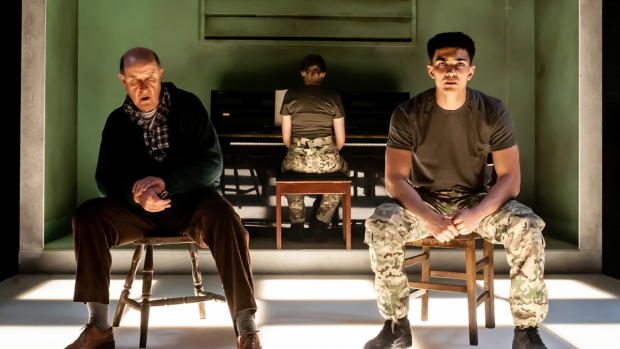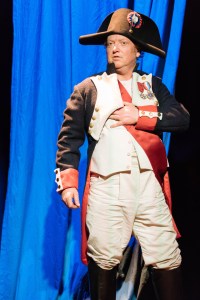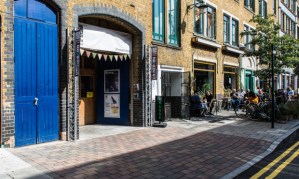Review: Not Talking (Arcola Theatre)
Mike Bartlett’s first play, which was performed as a radio play in 2006, makes its stage debut at the Arcola

© Lidia Crisafulli
Starting as a prize-winning theatre short while Mike Bartlett was still at university, Not Talking was eventually developed and produced as a radio play for the BBC. With its 2006 cast including the incomparable Richard Briers and June Whitfield, it effectively launched his career as a proper, paid writer.
So it must be particularly satisfying to see it now produced as a full-scale stage play, crisply directly by James Hillier and with a cast that does full justice to this early work.
Two pairs of people – an elderly couple, and two rookie soldiers – have stories to tell, which gradually intertwine. But each person has their own spin on what happened, so the full picture gradually builds in fragments and we are left to decide whose story we believe or care about most, as the links between the four of them seep slowly from the narrative.
No one actually talks directly to each other on stage throughout the performance – it's all reported speech, though the silent party is there, listening, as the other side of the story is told.
The play is broadly an analysis of the culture of silence, and the awful consequences that can follow from not talking about things that really need to be out in the open.
There are beautifully measured, lyrical performances from both David Horovitch and Kika Markham as James and Lucy, and both inject quiet humour and compassion into characters whose past behaviour hasn't always borne close inspection
Their early married life is wrecked by a chance of nature, but the real threat to their future comes with his decision to sign up as a conscientious objector at the start of the Second World War, a brave decision given how much derision – and worse – was meted out to many men who took this step.
The young pair are new recruits to the army. Lawrence Walker is bursting with raw energy as the adrenaline-fuelled soldier Mark, who wants to fall in love but doesn't quite know how, wants his mum to be proud, and cannot bring himself to disobey orders. An initial attraction to fellow recruit Amanda is scotched after she is raped by a senior officer, and a blanket of silence and complicity descends over everyone involved.
We risk joining the army's band of voyeurs as she describes the scene, but the hugely impressive Gemma Lawrence manages its retelling with a moving combination of honesty and delicacy.
Bartlett references the secrecy, suicides and the culture of abuse in the army that was in the public eye at the time the play was written, and also draws on his own grandfather's experience as a Second World War conscientious objector. The ties that bind the blindly obedient young soldier Mark to the committed Christian James create a tangled web, and a true hero's exit from the play for one of them, at least.
Music plays a vital part, and for the women at least, Chopin's work becomes a symbol of silence, accusation and betrayal. It's especially striking to have the performers play live on the echoing upright piano that takes centre stage in Amy Jane Cook's spare and carefully crafted set.
Bartlett's writing career is stratospheric these days, with successes like King Charles III and Dr Foster. But while a few plotlines stretch credulity, this early piece has all the marks of a writer who creates characters you feel you know, telling stories you want to hear.


















